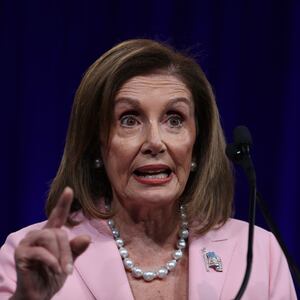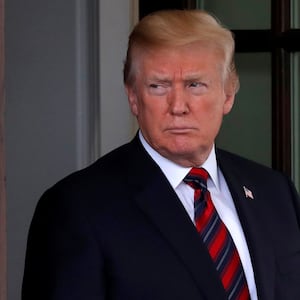Though Speaker Nancy Pelosi finally announced her support for impeachment proceedings on Tuesday, there are still major questions surrounding exactly what those proceedings will look like.
On one key front, however, there was no ambiguity whatsoever among the vast majority of Democratic members: They want to get it done—and fast.
“This is not something that's going to drag out for months,” Rep. Pramila Jayapal (D-WA) told reporters on Tuesday evening. “It is going to be expeditious. It's going to be quick, it has the speaker's full support, it has the Intel Committee’s and chairman's full support, and it is literally about impeachment. It is not about any other options.”
ADVERTISEMENT
In a closed-door caucus meeting on Tuesday afternoon, Pelosi explained to her caucus that the recent revelations about Trump’s contact with the Ukrainian government—in which he reportedly urged President Volodymyr Zelensky to open a dormant investigation into former Vice President Joe Biden—constituted a national security threat. And she made it clear that time was of the essence.
“Right now, we have to strike while the iron is hot,” Pelosi told Democrats, according to a senior Democratic aide. “This is a national security issue—a national security issue—and we cannot let him think that this is a casual thing, so that’s where I’m at.”
To Pelosi and Democratic leadership, that simple fact makes Trump’s alleged conduct, some of which he has admitted, an impeachable offense that warrants a quick, surgical strike from House Democratic investigators. It’s a stark contrast to the sprawling, complex investigations into obstruction of justice outlined in Robert Mueller’s report, which threatened to drag well into 2020 in the face of administration stonewalling for documents and testimony. And it differs in approach from inquiries that congressional Republicans have pursued in the past, including a special committee investigation into the 2011 consulate attacks in Benghazi that GOP officials kept going for years and even credited with damaging Hillary Clinton’s approval ratings.
Democrats, including vocal impeachment advocates, said on Tuesday that they have no desire to replicate that approach. The thinking goes that if they were to keep an impeachment inquiry going into 2020, they would risk losing the support and attention of a swath of the American public.
“The point of hearings is to drive home the information and that can be done in a discrete amount of time, definitely before the end of the year. Running an open-ended process has diminishing returns with the press, risks losing the thread and opens Democrats up to charges of fishing,” said Adam Jentleson, a top Democratic operative who has not been shy in the sharp elbow he’s thrown at lawmakers to start impeachment proceedings. “You play the hand you’re dealt and if you try to string this into 2020 to mess with the calendar it will be obvious to everyone.”
They also believe that, unlike with the Benghazi attacks, the major incriminating information is already plainly and largely known, making the need for discovery less paramount.
“What we have is impeachment wrapped in a box with a bow on top,” said Rep. Hank Johnson (D-GA), a Judiciary Committee member.
“The pattern here is very straightforward,” said Rep. Tom Malinowski (D-N.J.) “We are looking at one thing.”
But while Democrats were nearly unanimous in their desire for speed, they seemed to differ in their apparent understanding of other key facets of that process. For example, the mechanics of how the House would begin a formal impeachment inquiry, which have been ill-explained for some time, remained murky on Tuesday. “I wasn't clear about whether we're actually going to vote to open something, or we don't need to vote,” said a Democratic lawmaker exiting the meeting.
Rep. Mike Quigley (D-IL), an Intelligence Committee member, told reporters he could not offer any details on exactly what exactly happens next. “This is a caucus meeting, it's not a planning meeting,” he said.
Democratic members also appeared to be on different pages on another key part of the investigation—who’s running it—which could affect how quickly the proceedings move. After speculation about leadership moving to create a select committee to handle the investigation into Trump-Ukraine matters as well as impeachment, Pelosi affirmed in the caucus meeting that Judiciary Committee Chairman Jerry Nadler (D-N.Y.) would retain his jurisdiction over the impeachment process, which Judiciary has historically wielded.
It was a close call. One senior Democratic aide said that leadership was very close to establishing a select committee to handle the formal inquiry. “Nadler dodged a bullet,” one senior aide said.
Once more, speed was a consideration. Vocally pro-impeachment lawmakers had slammed the idea of establishing an entirely new committee to handle the Ukraine allegations, fearing that shifting the load away from Judiciary—which has done months of work to date—would slow down proceedings. Moderates, meanwhile, had warmed to the idea of siloing a national security-focused impeachment investigation into a new entity.
Some Judiciary Committee members acknowledged their approach needs to change as they take up the mantle of an energized impeachment investigation.
“We, of course, have to do better,” said Rep. Debbie Mucarsel-Powell (D-FL). “I think that what's going to happen in the Judiciary Committee is that we're going to be expediting the process of our impeachment inquiry, and expediting maybe some of the hearings that we would have scheduled in the coming weeks. They may happen very quickly.”
In the face of widespread agreement over the need to pick up the pace, it was left to a handful of Democrats—members of a much-diminished group of impeachment skeptics—to call for pumping the brakes.
Rep. Jeff Van Drew (D-NJ), a moderate freshman, has long called on Democrats to give up impeachment and focus on legislation. He told reporters that the Ukraine revelations haven’t much changed that viewpoint, and he urged Democrats to take a breath and review a transcript of Trump’s conversation with Zelensky—which the president has said he would release tomorrow—before proceeding further.
“I personally would slow down for sure,” said Van Drew. “I mean, we're talking about a day here until we see the unredacted version of it.”
Another impeachment holdout, Rep. Henry Cuellar (D-TX), one of the most centrist members of the caucus, deferred to Pelosi but declined to endorse impeachment.
“I’m not just going to jump on just because everybody's jumping on,” he said. “I mean, listen, if you look at the polls, where's the American public? Is there overwhelming support to impeach? It's not there yet. It's still not yet there.”
—with reporting from Sam Stein and Jackie Kucinich







